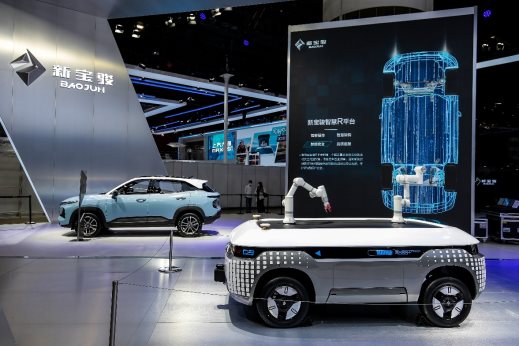SAIC-GM-Wuling honored No.1 BEV maker in China by 2020 sales
Shanghai (ZXZC)- SAIC-GM-Wuling (SGMW), a joint venture between General Motors and two Chinese automakers, was crowned the No.1 carmaker in China by 2020 all-electric vehicles sales by virtue of its GSEV (Global Small Electric Vehicle) series, said the company.

Hongguang MINIEV; photo credit: SGMW
According to the China Passenger Car Association (CPCA), the annual sales of SGMW's GSEV family, which include the Hongguang MINIEV, the New Baojun E300/E300 Plus, the Baojun E100 and the Baojun E200, totaled 174,005 units last year, surging 190% compared to the year-ago period. Notably, the Hongguang MINIEV had a cumulative sales volume of 127,651 units after hitting the market in July 2020. In terms of monthly sales, the mini-sized full-electric model was honored the best-selling new energy vehicle (NEV) model in China for the fourth month in a row as of Dec. 2020.
Based on consumers' demands and available scenarios, SGMW builds the GSEV architecture to refine the seating space, safety, energy consumption, power supply and after-sale services for small-sized EVs. Under the GSEV, the likes of the Hongguang MINIEV, the New Baojun E300/E300 Plus all feature minimalist physical platform, open hardware platform, highly-integrated software platform and smart cloud-based platform.
Based on the GSEV platform, SGMW has developed its driverless
logistics vehicles, smart governmental affair cars, smart mobile
temperature measuring cars, and self-driving cars for disinfection and
sterilization.

New Baojun Smart Magic Cube; photo credit: SGMW
In Nov. 2020, SGMW exhibited a mobile intelligent architecture called “New Baojun Smart Magic Cube” at the Auto Guangzhou 2020, which integrates modules of communications, driving, energy and drivetrain.
SGMW said it plowed 380 million yuan ($58.746 million) in a laboratory to push ahead with its development on electrification, intelligence, connectivity and car sharing. Recognized by the CNAS (China National Accreditation Service for Conformity Assessment), the lab is able to conduct testing and validation related to electric motors, batteries, ECUs, high-voltage auto parts, new energy complete vehicles, CAN (controller area network), HIL (Hardware-in-the-loop), intelligent driving and big data.

